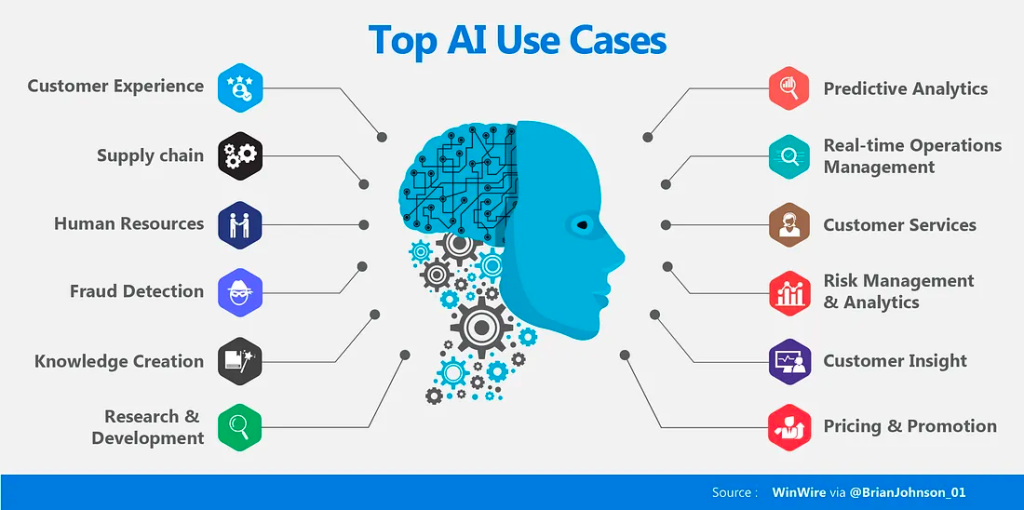Published on: May 3, 2023 Updated on: February 1, 2024
Artificial Intelligence vs. Computer Science: The Complete Guide
Author: Christina Muir

To the average person comparing artificial intelligence and computer science is like comparing apples to…apples, right? Well, the nerds out there say you could not be more wrong; these two technologies have many differences that have led them down very different paths in our world.
However, you’re not totally off-mark, as they are related in some ways. Both involve computer programming, but what these programs are designed to do puts them in different ballparks.
We’re not going to get too technological, though, and will stick to the basics (which are still quite complicated). So, get ready to learn all of the ways in which artificial intelligence and computer science differ. You may even be inspired to pursue one of them further.
Introduction to artificial intelligence
Every time you enter AI into the Google search bar, your mind will be blown by the strides it takes seemingly every single day. From self-driving cars to creating music, AI systems can do pretty much anything with scary amounts of accuracy.
A lot of technological advancement has needed to take place behind the scenes to get to this point, though. Making machines learn and execute tasks just as a human would is the ultimate goal of AI; let’s look at how it all works.
There are subsets of AI that make up the big picture, including:
- Machine Learning (ML): Uses algorithms to analyze and learn from data, allowing AI machines to improve their performance over time.
- Neural networks: Mimics the function of the human brain, which enables AI to process complex information such as videos, speech, and text.
- Natural Language Processing (NLP): Gives AI the ability to fully comprehend human language, including intent, emotional tone, and syntax. Natural language processing is used in virtual assistants such as Alexa and Siri.

To make AI functional and adaptable in its environment, whatever it may be, it needs to learn hundreds of things at a fast pace. This is why they use data sets to collect and store everything they will need to know. It contains parameters from various places, such as human input via text, voice recordings, and images.
By paying close attention to this data, AI can make predictions based on patterns and trends demonstrated within it.
This can be applied differently, but we will use a self-driving car in this example. Cameras and radars on the outside of the car are used to identify obstacles and objects on the road. AI algorithms look at this footage and process sensor data to predict how the object might move and, therefore, the best way to navigate around them safely.
This is just one of the many things AI can do; you’ll have to keep your finger on the artificial pulse to keep up to date with its evolution.
Introduction to computer science
Even though it is called computer science, the term was coined before computers existed.

The theory was there, but the machines were not. Alan Turing was an exceptional mathematician who could develop programs using computer science without even having machines available to run them. All he needed was logic and mathematics; the rest is history.
Artificial intelligence wouldn’t be nearly as advanced today if it weren’t for computer science. Essentially, when humans want a computer to do something, they use computer science to communicate with them and make them do it.
Like Spock, computer science focuses on logic and has immense brain power. Its main goal is to solve problems and make life easier for humans by taking care of boring, repetitive tasks for them. Computer science and information technology are responsible for many of our life’s luxuries, such as making education more accessible and improving health care.
Computer science encompasses lots of different technological practices, but here are some of the most important ones you should know about:
- Computer programming: Computer programmers write code in languages such as Python and PHP to create applications and software.
- Human-computer interaction (HCI): The study of how people and computers interact with one another and how to design user-friendly interfaces.
- Data science: How to extract knowledge and insights from large data sets (big data) using computer algorithms.
Uses
Both artificial intelligence and computer science are used all around us every day but can be invisible to the untrained eye.
Artificial intelligence
- Virtual assistants: Virtual assistants can be used for almost anything. They can answer your questions, provide the weather forecast, and translate from one language to another. Being able to understand human language in text and speech forms with fluctuating clarity is what makes AI and NLP the perfect tools to do so.
- Personalized marketing: Without AI, personalized marketing would be arduous and still not be as effective if done by humans. Each customer has their user behavior and demographic information paid close attention to. Being made to feel special makes a company stand out to customers. AI can predict how people will behave in the future and alter their websites and social media marketing to adhere to it.

- Image and speech recognition: AI can take one look at an image stored in your phone and will know what it is straight away. It refers to its large data set of objects, such as houses, cars, and flower types, to help identify what it’s looking at. What’s so great about this machine learning is that it gets better and better with time as its data set grows. With speech recognition, the sound waves of your voice are analyzed to identify what you’re saying and in what tone. Image and speech recognition use neural networks to mimic human intelligence and improve accuracy with time.
- Navigation: The maps and navigation app on your phone uses AI to pinpoint your location accurately and tell you what route is best for you depending on time, real-world traffic, and weather conditions. It will also pay attention to the routes that you favor and the shops you frequent so that it can cater to future suggestions.

Computer science
- Entertainment: TV shows, movies, and video games that use realistic 3D graphics rely on computer science. Techniques such as physically-based rendering and ray tracing are implemented for shading and lighting effects – which are important for adding realism. Computer science is also used for audio processing in entertainment and increasing the quality of audio by removing background noise or glitches in real-time.
- Social media: You know how you can spend hours on social media without even realizing it? That is due to computer science using lots of data structures to create an interface you just can’t turn away from. They are intuitive and easy to use, using particular color palettes and graphics for optimization to keep you hooked.
- Healthcare: Computer science has led to breakthroughs in the medical research industry. With huge collections of imaging, genetic, and clinical data being analyzed quickly and accurately, there is a lot less room for error. Wearable health monitors such as fitness trackers and smartwatches are created with computer science. If the wearer suffers from low blood pressure or a heart attack, for example, nearby hospitals can be notified immediately.
- Finance: When it comes to trading in the financial market, computer science algorithms are used to execute them with low risk and high reward. Even payment transactions that average people do every day are conducted via computer science.
Studying
Studying artificial intelligence and computer science is not exactly a walk in the park. You would be best suited if you like mathematics, logic, and problem-solving. Nevertheless, anyone can study these exciting areas if there is a driving passion to change the world.
With a BSc or bachelor’s degree in these areas, many doors will open up for you, and if you put in the work, you will meet your career goals in no time.
Artificial intelligence
- Curriculum: Depending on what university you study at, the AI curriculum will vary. But, as a guideline, you can expect the course to cover computer vision, programming, computer systems, and linear algebra. These are the fundamentals of artificial intelligence and machine learning. From there, you will have the opportunity to specialize in data analysis, deep learning, or robotics, just to name a few.

- Resources: Since this course can be challenging for many students, it is important that resources are in place to offer support whenever needed. You will have access to cutting-edge technology and labs with all the necessary equipment. There are also faculty members that advise on career opportunities, coursework, and research projects.
- Projects: As a student, you will have many exciting opportunities to complete projects demonstrating your skills and building your portfolio. If you’re really good, your project could be published and displayed at conferences and presentations.
- Fees: Again, it depends on where you study, which will alter your course fees. For example, at Stevens Institute of Technology, their Applied Artificial Intelligence masters course costs $56,985 for 3 semesters. Of course, not everyone can afford this, but there are more budget-friendly options out there. The University of Bridgeport offers a course for $36,540.
Computer science
- Curriculum: In a computer science degree, you will learn everything from the fundamental principles to practical, in-depth skills needed to develop your very own software. At an undergraduate level, it is common to learn about computer networks and databases as well as computer security. There is so much that goes into computer science that it is guaranteed you’ll never be bored. You can then specialize in subjects such as game design, cybersecurity, or software development.
- Resources: You will have access to the best of the best computers that are more than powerful enough to do anything you ask of them. Tech universities are known to have huge labs full of study space and computers available almost 24/7. If you’re struggling with your computer science course, you can always turn to your course advisor for guidance.
- Projects: Since so many aspects go into the field of computer science, your projects will also range in subject. You could be doing research assignments that require lots of writing, sourcing, and of course, researching. Or, for a more hands-on approach, you could do a topic using machine learning that involves developing machine learning algorithms.

- Fees: Computer science is an incredibly valuable degree to have. But getting this badge of honor will cost you, depending on your university. Stanford University’s computer science course costs about $56,487 per year. Being a computer scientist can be expensive, but it’s always worth it.
Careers
Now that you have gone through the rigorous, challenging (yet rewarding) artificial intelligence and computer science course, it is time to reap the rewards and see what careers are waiting for you on the other side. Computer science professionals and artificial intelligence experts can enjoy fruitful careers in many different industries.
Artificial intelligence
Robotics engineer: If you love designing, developing, and testing robots, you will love being a robotics engineer. You will need a combination of mechanical, software, and electrical engineering skills to thrive in this role. Robotics engineers can be found in many industries, from healthcare to entertainment.
Data scientist: This career involves a lot of number crunching, with the main task being to extract insights and knowledge from all sorts of data. One of the biggest challenges of this job is taking this data and presenting it in a way that others will understand in industries such as finance and marketing.
AI project manager: Any project with AI at its base will need an AI project manager to keep it all on track. You will be in charge of task delegation, budgeting, and communicating with stakeholders. It can be a busy career, and being adaptable is essential for quick decision-making; therefore, having a range of skills is desirable.

Computer science
Software developer: Also known as a software engineer, this role is always in high demand in companies all around the world. Therefore, it is a great career path to go down if you want a very high chance of landing a job no matter where you are. For computer scientists in software development, the majority of your time will be spent coding with languages such as Java, C++, and Python. As well as developing software, you must attend meetings, talk to clients, and test your software regularly.
Web developer: Websites are incredibly influential on the success of a business, and if you want to make dreams come true, then being a web developer might be for you. You can go into frontend, backend, or full-stack, which is a combination of both. Programming languages like CSS, HTML, and JavaScript are the most common ones to use in this role.
Systems analyst: In this role, you will be responsible for making businesses more efficient and effective by analyzing their operating systems and procedures. When choosing an industry to specialize in, the possibilities are endless. From education and technology to entertainment
Key takeaways
After breaking it down and looking further into these technologies, you can see that artificial intelligence and computer science are intertwined in many ways. So much so that if it weren’t for the other, they would be obsolete.
Ultimately, computer science studies computers and automation, whereas AI is a subfield that focuses on simulating human intelligence. Both are essential for driving technological innovation forward and will continue down the road hand in hand, ready to take on the next evolution together.
Were you aware of the differences between artificial intelligence and computer science? To dive deeper, head on over to Top Apps.
Christina Muir
Christina's expertise in the tech industry allows her to provide insightful and informative content to her readers, covering a range of topics from productivity and lifestyle apps to gaming and entertainment software.
Recent Articles

Learn how to use advanced search tools, newsletters, and reviews to uncover the perfect AI-focused podcast for you.
Read More
Explore the top beginner-friendly AI podcasts. Our guide helps non-techies dive into AI with easy-to-understand, engaging content. AI expertise starts here!
Read More
Explore the features of The AI Podcast and other noteworthy recommendations to kick your AI learning journey up a notch. AI podcasts won’t...
Read More